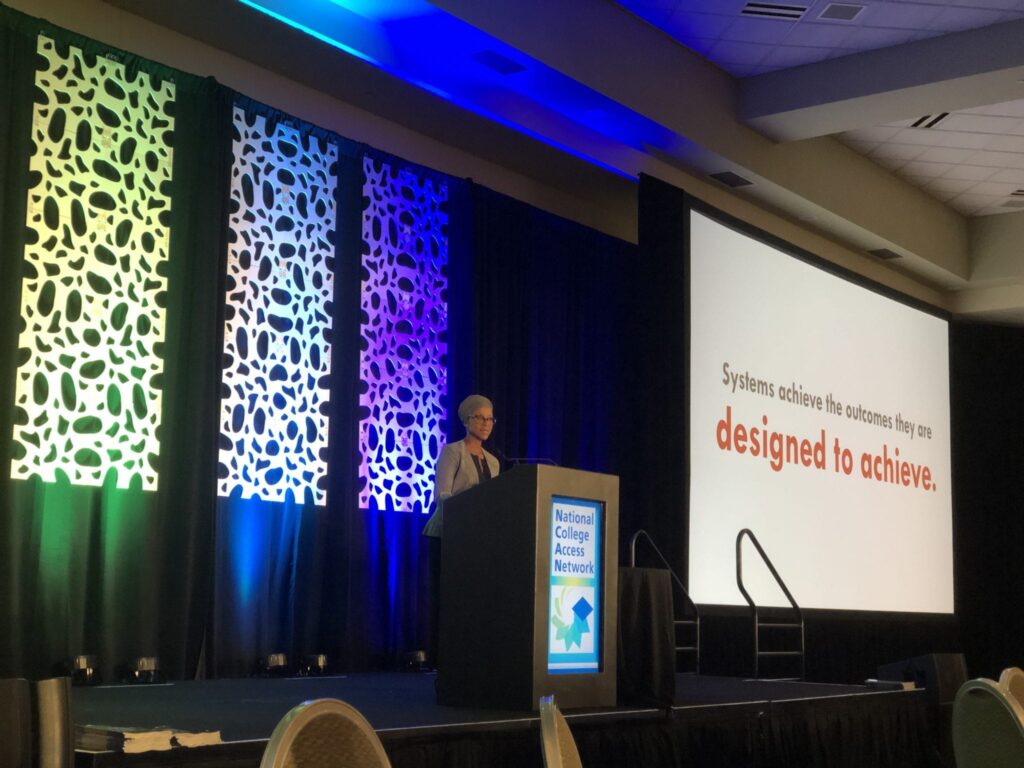PFS Cohort’s NCAN ReflectionsAdvancing Equity and Keeping Student Outcomes at the Center of the Work
This blog series is centered on Third Sector’s assessment on applicability of Pay for Success in higher education in partnership with a new cohort of stakeholders. This is post #4 of the series.
“Systems achieve the outcomes they are designed to achieve,” Alex Bernadotte, founder and CEO of Beyond12 shared during a plenary at the National College Access Network (NCAN) conference in Indianapolis last month. Bernadotte explained the Higher Ed system is “inequitable by design” and failing underrepresented student populations: students of color, low-income, first-generation, and adult students, student-parents, English language learners, and more. Fewer of these students enroll, persist, and complete education and training programs than their peers. When college degrees are still seen as a currency of validation, failing to support these students to and through college is about more than just credential completion or even a degree. It’s also about opportunity, economic mobility, and self-actualization. The idea that the system is failing underrepresented student populations wasn’t new, but Bernadotte’s fresh framing of the solution captivated the audience: to build a new system, we need new and diverse “architects,” especially those that weren’t at the table to begin with, working in intentional, meaningful, and sustained collaborations.

The imperative and urgency to improve college access and success equity was well understood by the audience; the NCAN conference brought together over 1,100 mission-driven individuals representing 600 community-based organizations, higher education institutions, school districts, foundations, and other partners dedicated to closing equity gaps in postsecondary attainment for all students. The conference also provided an ideal opportunity for Third Sector’s Pay For Success (PFS) in Higher Education National Cohort (PFS in Higher Ed Cohort) to connect with subject matter experts, learn about theories of change and promising practices in the field, and contribute their unique perspectives as states and systems of higher education.
Beyond the plenary speeches, equity in opportunity and outcomes - and how to achieve it - continued to be a core theme throughout the conference. While the field still has much to learn, there is already a solid evidence base of strategies and service models that effectively improve outcomes like enrollment, persistence, and completion. Implementing these strategies at scale, customizing them based on changing student needs, and sustaining them over time will require intentional collaboration between service providers, state departments of higher education, educators, and philanthropy, with each contributing their distinct perspectives and assets. In other words, achieving equity in student outcomes will require dynamic, cross-sector partnerships and diverse stakeholders united under a common goal, as plenary speaker and Bottom Line CEO, Steve Colón framed it. “In order to be successful, we must work across the things that divide us." One way of reaching across silos is through innovative funding relationships between higher education institutions (HEI), states and systems, and providers. Unfortunately, there are limited examples of such financial relationships that enable these entities to work together to align resources to results.
PFS financing addresses this challenge. At its most basic level, upfront investors or grantors provide capital to fund a service or intervention and public agencies repay that investment if agreed-upon outcomes (like higher graduation rates, for example) are achieved for a specific population of focus. PFS allows HEIs and systems a low-risk way to fund wraparound student support services, while also ensuring providers have longer-term capital to cater to high-need populations and can execute on their mission. The outcomes achieved in a PFS model support HEIs with higher rates of enrollment, persistence, and graduation. Third Sector’s PFS in Higher Ed Cohort is building the capacity of states and systems to engage providers and HEIs as contracting partners in achieving outcomes through training and technical assistance (TTA), stakeholder engagement, and other resources and perhaps, to eventually launch pilot PFS projects.
In continuation of the past three months of virtual TTA, Third Sector supplemented the NCAN conference experience with additional in-person workshops to promote cohort sites’ further exploration of specific PFS components like service model evaluation and outcomes-based financing to advance their understanding of, and progress towards, potential PFS projects.
Concurrently, Third Sector formally kicked off our Provider Advisory Group, a group of eight college access and success providers, selected based on our RFI this summer, who will join the PFS in Higher Ed journey and shape how states and systems may procure for wraparound support services for specific, under-resourced student populations. The providers, Catholic Charities Fort Worth, College Forward, College Possible, Edquity, Educate Tomorrow, InsideTrack, One Million Degrees, and uAspire, are each leaders in this field who have a track record of supporting students day-to-day. Their daily interactions translate into critical perspectives on student needs and lived experiences that are invaluable in our collective understanding of what moves the needle on enrollment, persistence, and graduation outcomes. These providers - and the students they work with - are some of the “architects,” in Bernadotte’s words, that we’ll need at the table to build a new, more equitable system.
In his plenary speech, Bottom Line’s CEO reminded the audience that average, one-time outcomes are not good enough: “Our obligation to equity is our insistence on excellence.” This resonates at Third Sector; we also believe it is our collective responsibility to focus on replicable and sustainable impact. At the end of the day, it’s not about getting just one student or even one hundred students ‘to and through’ college, it’s about fundamentally shifting the way governments and communities work together, how we elevate and finance what works, and how we ensure accountability for student success throughout the higher education system.
As we co-create roadmaps towards potential PFS projects, cohort sites have been actively engaging diverse, cross-sector stakeholders to develop the most thoughtful and sustainable project and ensure positive outcomes. With fresh perspectives from our Provider Advisory Group, the cohort will continue its efforts through 2019 to launch new state/system, provider, and institutional partnerships in pursuit of student outcomes.
